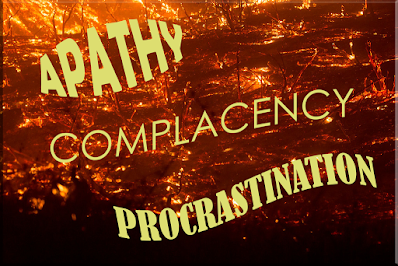 |
| (Photo: Kari Greer/USFS) |
Neuroscientist Dr. Donald T. Stuss* defines apathy as the "absence of responsiveness to stimuli, with the requirement that this lack of responsiveness be demonstrated by a lack of self-initiated action."
Merriam-Webster defines complacency as "self-satisfaction especially when accompanied by unawareness of actual dangers or deficiencies."
Merriam-Webster defines complacency as "self-satisfaction especially when accompanied by unawareness of actual dangers or deficiencies."
I cannot help but wonder if we have been living in these states from quite some time. When I say "we," I mean the world, the U.S., the states, the wildland fire service, and any of us who should have known better.
We have all talked a good talk, but action is what matters. Articles have been written (see the challenge below), blogs have been written, plans have been developed, etc. That is all great, but words are fruitless without action. We were warned by virologists, epidemiologists, and other infectious disease specialists to be prepared. From a quick scan of infections and deaths, we seem far from prepared.
I took a quick glance at the Wildland Fire Lessons Learned Center's "Covid-19 and Fire Season 2020" forum and see that people are witness both apathy and complacency from managers and team members with regard to pandemic response.
Leadership is what matters during a crisis. Whether you believe it or not, leaders have a duty to take care of their people—all their people, not just the ones who believe the way they believe. The pandemic has caused a shift in the way we do business. If you didn't shift, you are behind the curve. Your mindset could be your demise. Our values of duty, respect and integrity have never mattered more.
If we treat the pandemic as something "routine"—just another risk—we fail the very people we are here to serve. Never on the fireline should we hear, "Shut up and dig!" Now more than ever, each member of the team needs to look out for one another, respect the boundaries and values of one another, and work together in a cohesive manner to achieve the goal. Our mindset must be, as the video below says, "Nothing is Routine."
We have all talked a good talk, but action is what matters. Articles have been written (see the challenge below), blogs have been written, plans have been developed, etc. That is all great, but words are fruitless without action. We were warned by virologists, epidemiologists, and other infectious disease specialists to be prepared. From a quick scan of infections and deaths, we seem far from prepared.
I took a quick glance at the Wildland Fire Lessons Learned Center's "Covid-19 and Fire Season 2020" forum and see that people are witness both apathy and complacency from managers and team members with regard to pandemic response.
Leadership is what matters during a crisis. Whether you believe it or not, leaders have a duty to take care of their people—all their people, not just the ones who believe the way they believe. The pandemic has caused a shift in the way we do business. If you didn't shift, you are behind the curve. Your mindset could be your demise. Our values of duty, respect and integrity have never mattered more.
If we treat the pandemic as something "routine"—just another risk—we fail the very people we are here to serve. Never on the fireline should we hear, "Shut up and dig!" Now more than ever, each member of the team needs to look out for one another, respect the boundaries and values of one another, and work together in a cohesive manner to achieve the goal. Our mindset must be, as the video below says, "Nothing is Routine."
Never again should a serious accident report quote witnesses as saying, "It was an ordinary fire..."
Wildland Fire Leadership Challenge - Digging a Little Deeper
- Discuss an event that looked routine that turned into a crisis situation.
- How did your involvement in the crisis situation change your leadership?
- Read "The Comfortable Routine of Complacency" 1. Discuss areas where your department may have become complacent in training or performance.
- Read "High Performance in Emergency Preparedness and Response: Disaster Type Differences" by Herman B. “Dutch” Leonard and Arnold M. Howitt, Kennedy School of Government.
2. Discuss areas where you have become personally complacent in your application of best practices.
3. Discuss ideas about how to break the cycle of complacency in your organization.
Pam McDonald is a writer/editor for BLM Wildland Fire Training and Workforce Development and member of the NWCG Leadership Committee. The expressions are those of the author.
*Source: Robert van Reekum, M.D., F.R.C.P.C.; Donald T. Stuss, Ph.D.; and Laurie Ostrander, R.N. "Apathy - Why Care?" The Journal of Neuropsychiatry and Clinical Neurosciences. 2005.
No comments:
Post a Comment